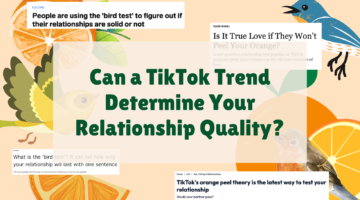Sex Question Friday: Why Is Being Single So Stigmatized?
November 2, 2012 by Justin Lehmiller
Every Friday on the blog, I answer people’s questions about sex, love, and relationships. This week’s question comes from a reader of the blog who wanted to know why society seems to treat single people so unfairly.
Why do people always ask “what’s wrong with you?” when they find out I’m single?
Despite the fact that the marriage rate is in decline, most people continue to view the institution positively and think of marriage as the ideal relationship state [1]. Just look at how much money people are willing to spend on weddings and how it remains a social custom to shower people with gifts when they get engaged or married. In contrast, people who are single or divorced are rarely (if ever) celebrated for their relationship status. As Carrie Bradshaw once put it, “Hallmark doesn’t make a ‘congratulations, you didn’t marry the wrong guy’ card.”
Being single is viewed as a “deficit” identity [2], meaning that singles are perceived as incomplete because of their lack of a relationship. As if that weren’t bad enough, singles are also blamed for this perceived “deficiency.” For instance, in a recent survey of college undergraduates, participants were asked to identify the most common characteristics associated with people who are either married or single [3]. Whereas married people were described in a very positive light (e.g., as nice, honest, and mature), singles were typically described in very harsh and negative terms, including lonely, immature, and ugly.
As a result of these negative stereotypes, people seem to feel that singlism (the scientific term for prejudice against singles) is justified. In fact, people think it is much more legitimate to discriminate against singles than it is to discriminate against people based upon other personal characteristics (e.g., race, gender, sexual orientation). Consistent with this idea, in one study, participants were asked to evaluate a set of property rental applications and to select they applicant they would prefer to have as a tenant [4]. Participants overwhelming chose married couples over single people and happily stated that they based their decision largely upon the applicants’ marital status. Thus, people do not even feel ashamed or embarrassed to admit holding this bias. This may stem, in part, from the fact that this kind of discrimination is legal in many parts of the United States and a number of other countries.
In short, as long as people continue to put marriage and other long-term, committed relationships on a pedestal, we can expect that those who are unattached will continue to be “singled out.”
To learn more about how and why singles are stigmatized by society, here’s a great read.
For past Sex Question Friday posts, see here. Want to learn more about The Psychology of Human Sexuality? Click here for a complete list of articles or like the Facebook page to get articles delivered to your newsfeed.
[1] Thornton, A., & Young-DeMarco, L. (2001). Four decades of attitudes toward family issues in the United States: The 1960s through the 1990s. Journal of Marriage and the Family, 63, 1009-1037.
[2] Reynolds, J., Wetherell, M., & Taylor, S. (2007). Choice and chance: Negotiating agency in narratives of singleness. The Sociological Review, 55, 331-351.
[3] DePaulo, B. M., & Morris, W. L. (2006). The unrecognized stereotyping and discrimination against singles. Current Directions in Psychological Science, 15, 251-254.
[4] Morris, W. L., Sinclair, S., & DePaulo, B. M. (2007). No shelter for singles: The perceived legitimacy of marital status discrimination. Group Processes and Intergroup Relations, 10, 457-470.
Image Source: 123rf.com

Dr. Justin Lehmiller
Founder & Owner of Sex and PsychologyDr. Justin Lehmiller is a social psychologist and Research Fellow at The Kinsey Institute. He runs the Sex and Psychology blog and podcast and is author of the popular book Tell Me What You Want. Dr. Lehmiller is an award-winning educator, and a prolific researcher who has published more than 50 academic works.
Read full bio >


